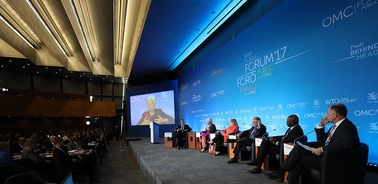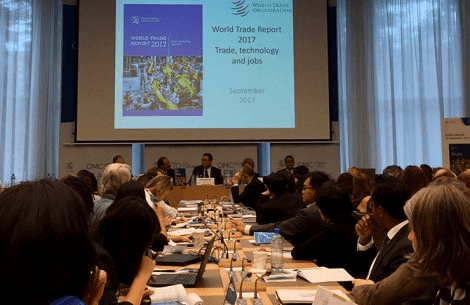- Home
- We Are Law School
- News
- Trade Behind The Headlines - Some Thoughts From The Wto’s Public Forum 2017
Trade behind the headlines - some thoughts from the WTO’s Public Forum 2017

In the last week of September, the World Trade Organization (WTO) held its annual public forum in Geneva, Switzerland. It is a three-day event open to anyone interested in world trade, globalisation and economy. Basically, that should include all of us but considering that most people (unfortunately!) are not extremely interested in the WTO, the public was mainly made of diplomats, scholars and students working on trade matters.
In any case, the WTO can be applauded for trying to be more open towards the public. This is especially important now when globalization is increasingly questioned and protectionist movements are growing. This year’s theme was “Trade behind the headlines”. Such title would not have been as appropriate less than a decade ago when trade was not yet the everyday topic of editorials but today the reality is different. Strange acronyms such as TTIP and TPP have entered dinner table discussions, and everyone has heard of NAFTA – the favourite curse word of President Donald Trump.
Trade and technology drive globalization
The event coincided with the publication of the WTO’s World Trade Report for 2017, titled as “Trade, technology and jobs”. It does not get more topical than that. The impact of technology and trade is positively impacting hundreds of millions of people around the world but the negative side effects are felt too. They have been experienced, for example, by the American blue-collar communities in areas like the Midwest and they have contributed to the political victories of old-fashioned protectionists in Europe too. The perceived advantages of globalization are not working out for everyone. While the U.S. and the EU as a whole continue to benefit from trade and technological advances, some people are left behind. The fast pace of change adds to the challenge. In the long run, technology improves efficiency and productivity, creating new opportunities and entire business sectors. However, similarly to trade, it creates job losses too.
The impact of technology and trade is positively impacting hundreds of millions of people around the world but the negative side effects are felt too.
Routine jobs are fast becoming automated. Outsourcing to other countries also plays a role but research shows that the effect of trade on U.S. manufacturing jobs has been mild compared with automation and technology. However, immigrants and foreign workers are often easier to blame than robots. The effects of trade should, however, not be played down either. They are real and devastating on some parts of the society, especially on the less educated. Globalization and growth in world trade have experienced setbacks in the aftermath of the global financial crisis but the fourth industrial revolution is likely to speed up the process soon again. Technological advances in distance work and automatic translation are likely to open the global labour market in ways that could not have been even dreamt of just some years ago. This brings huge challenges to policy makers who must face the re-organization of jobs by quick adjustments in educational and re-distribution policies. Globalization cannot, and should not, be stopped but smart and efficient national, regional and global responses are needed to manage it. One of the speakers in the opening plenary of the Forum, Christine Lagarde, the Managing Director of the IMF, expressed her fear of digitization outpacing the human adjustment to it. She, like most speakers at the Forum, underlined the importance of education in answering most of our future challenges. Especially the significance of combining soft skills with hard skills came up repeatedly.
The digital services economy takes over
Much time was deservingly used to discuss why the tide is turning against globalization especially in the developed countries. Another major topic was the growing divide in the expectations between the developed and the developing countries, especially the least-developed ones. Many panels of the Forum focused on the formulation of new rules on digital trade, especially on e-commerce. This year’s forum could also be dubbed as the “blockchain Forum”, that often was the new technology brought up. The need to address the regulatory requirements of the digital economy were widely acknowledged.
The diminishing, or at least drastically changing role of traditional manufacturing industry was also hotly debated. Professor Lionel Fontagné from the Paris School of Economics talked about his recent book “The Factory-Free Economy”, co-edited with Ann Harrison (The Wharton School, University of Pennsylvania). Their evidence suggests that de-industrialization is a process taking place over time in all countries, even China. Another important development is that the distinction between manufacturing and services is becoming increasingly blurry. Moreover, the more developed a country becomes, the more relevant are services to its economy. While firms in industrial countries may be able to exploit the high-value added and skill-intensive innovation and design activities, they cannot do that without proper investments in new infrastructure and education to prepare the next generations.
All this drastically contrasts with the issues that are most pressing for the least-developed countries (LDCs). A representative from one LDC explained his frustration to me. Why should they take interest in the blockchain and digital trading rules when the biggest part of their population does not even have access to electricity, let alone to the internet, he complained. Many developing countries are likely to benefit from the re-arrangement of the global labour markets but the position of LDCs is extremely worrying as they are increasingly left behind. They are, in essence, expected to make a direct jump to high-tech societies. If the specific needs of the LDCs are not addressed, this is not likely to happen as they do not have the technological ability to gain from extreme connectivity.
Christine Lagarde, the Managing Director of the IMF, underlined the importance of education in answering most of our future challenges. Especially the significance of combining soft skills with hard skills came up repeatedly.
How to keep everyone on board?
One of the sad truths is that the WTO’s latest negotiation round, the so-called Doha Round, is practically dead. Most advances are now made in the so-called preferential trade agreements that bring together certain geographic regions or groups of like-minded countries. This is an understandable development, considering that further liberalization of international markets requires measures going far beyond the traditional elimination of border tariffs. Measures relating to the opening of services markets and public procurement, for example, are often easier to agree upon between countries with similar levels of development and societal preferences. However, a complex bundle of trade agreements creates fragmentation that is negative for business. The move away from international trading rules that are agreed among all countries in the WTO also poses risks especially to the poorest countries that have no access or little say in the various bilateral and regional agreements.
The participants to the Forum expressed no high hopes for the WTO’s next Ministerial Conference in Buenos Aires this December. The developed and some tech-savvy developing countries are pressing for new rules on e-commerce but there is little consensus on anything. That is a shame as new rules are urgently needed across a variety of areas, from the digital sphere to agriculture and services. The WTO is still central but its role is starting to be closer to a discussion club than a global rule-setting body. Moreover, one its core and best-functioning pillars, trade dispute settlement, is currently under heavy pressure from the U.S. administration which is refusing to appoint judges to fill the open positions in the highest organ of the Dispute Settlement Body, the Appellate Body.
Our time is urgently calling for new global rules and more international cooperation but the differences in preferences and the complexity of the issues involved make it increasingly hard for countries to do that together. At the same time, the digital divide is growing and some countries are left behind. The same concerns certain parts of the population also in the most developed countries. Inclusive trade, social and educational policies are needed everywhere. As Paul Krugman, the Nobel Prize-winning economist and one of the speakers of the Public Forum put it, globalization is central to today’s success stories in development. At the same time, we must keep the focus on meaningful employment. Having a job means more to most people than having an income from that job. It is the dignity of life that matters, not just the GDP. If the disruptive forces of the new globalization and automation are decently managed, human workforce can focus on creating more meaning and value. How to manage those forces amid growing protectionism and the decline of international institutions is the big question of our time.
Written by: Johanna Jacobsson, Professor of International and European Law
Featured Photo: © WTO/Jay Louvion
